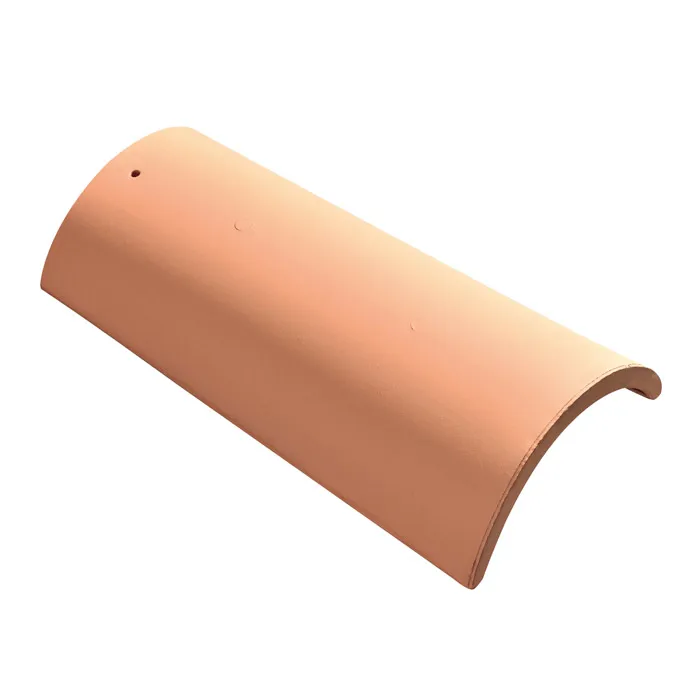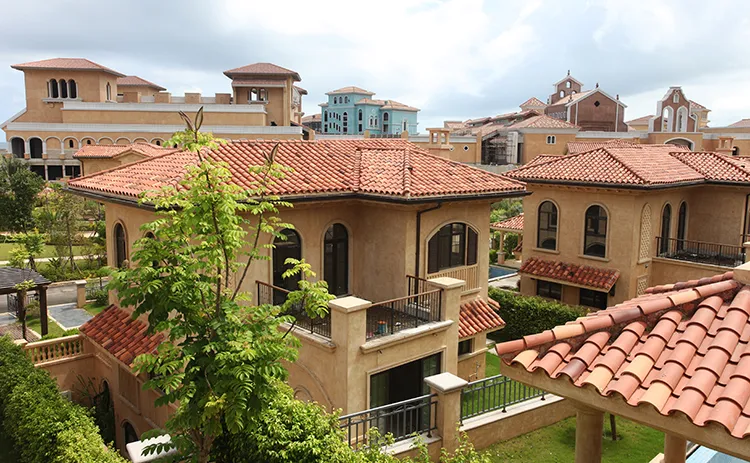As a classic roofing material, clay tiles are widely used around the world for their elegant appearance, excellent weather resistance and long service life. However, when choosing clay tiles as roof covering materials, many architects, contractors and homeowners often face a series of questions about weight and structural support. The weight of clay tiles, compatibility with roof structures and how to ensure that the roof can bear the weight of clay tiles are crucial factors.
So, how much does a 100 square foot clay roof tile weigh? Can such heavy tiles be installed on wooden roof structures? This article will explore these two questions in detail and provide professional advice for related roof design and construction.

The impact of the weight of clay tiles on roof structures
Clay tiles are a roofing material made of natural clay fired at high temperatures. Due to their strong characteristics, clay tiles are usually heavy, which is one of the reasons why they are windproof, fireproof and durable. However, it is precisely because of this weight that the load-bearing capacity of the roof structure needs to match it. If the tiles are not properly supported, they can weigh down the roof and even cause structural damage.
1. How much does a 100 square foot clay roof tile weigh?
Clay tiles usually weigh between 6 and 12 pounds per square foot, depending on the type of tile, design, manufacturing process, and density of the raw materials. The total weight of tiles required for a 100 square foot roof will vary depending on the type of clay tile.
Standard clay tiles weigh between 6 and 8 pounds per square foot, which is about 600 to 800 pounds (270 to 360 kg) for 100 square feet.
Heavy clay tiles can weigh more, up to 10 to 12 pounds per square foot, which means that a 100 square foot roof tile can weigh as much as 1,000 to 1,200 pounds (450 to 540 kg).
In addition to the weight of the tiles themselves, other parts of the roof (such as the supporting structure, baseboard, etc.) also add a certain amount of weight. Therefore, the load-bearing requirements of the entire roof must be considered during design and construction.
2. Requirements of the weight of clay tiles on the roof structure
The weight of clay tiles places high demands on the load-bearing capacity of the roof. The roof structure needs to be strong enough to carry this weight and distribute it to other parts of the building. The traditional roof structure includes roof beams, roof trusses, roof panels and other parts, and the design and material selection of these parts will directly affect the load-bearing capacity of the roof.
For different roof structures, the weight that can be borne is different. For example, the traditional wooden roof structure needs to consider the weight of the tiles when designing and ensure that the wooden beams or trusses can evenly distribute the weight. If the roof structure is not strong enough, overweight tiles may cause damage to the wooden roof structure.

Is clay tile suitable for installation on wooden roofs?
As a traditional and widely used roof structure, wooden roofs have been widely used in many residential and small buildings. However, the strength and durability of wood are different compared with other structural materials (such as steel, concrete, etc.). Therefore, whether clay tiles can be installed on wooden roofs needs to be analyzed according to specific circumstances.
1. Load-bearing capacity of wooden roofs
Wooden roofs usually use wooden beams or wooden trusses to support the roof structure. The strength and load-bearing capacity of wood is affected by a variety of factors, including wood species, size, span, and construction techniques. Without adequate support, heavy clay tiles can cause unnecessary stress on a wood roof, causing the roof to bend, crack, or deform.
Generally speaking, the load-bearing capacity of a wood roof structure is usually between 30 and 50 pounds per square foot. Assuming the use of standard clay tiles (8 pounds per square foot), 100 square feet of clay tiles weigh about 800 pounds. For a wood roof, this weight may be at the higher end of the structural load-bearing capacity, so in this case, it is necessary to ensure that the roof beams, trusses, and other supporting structures can withstand the weight of the tiles.
2. Design and reinforcement measures for wood roofs
To ensure that a wood roof can bear the weight of clay tiles, designers and builders usually need to make appropriate reinforcements during the design. These reinforcement measures may include:
● Increase the strength of roof beams and trusses: Increase the load-bearing capacity of the structure by using larger-sized wood beams or wood trusses.
Use higher-strength wood: Choosing denser and stronger wood (such as hardwood) as the supporting material for the roof can increase the load-bearing capacity.
● Add support points: Set up additional support points on the roof to help distribute the weight and ensure that the wooden roof will not be damaged due to excessive weight.
● Use steel structure reinforcement: For roof structures with higher load-bearing requirements, steel beams or steel trusses may be used for reinforcement to increase the load-bearing capacity of the wooden roof.
3. Tile installation and fixing method
In addition to ensuring the load-bearing capacity of the roof structure, the correct tile installation method is also the key to ensuring the safety and durability of the roof. During the installation process, the tile fixing method must be strictly in accordance with the regulations to ensure that the tiles will not shift or fall off due to wind or external forces.
When installing clay tiles on a wooden roof, it is usually necessary to use special nails or bolts to fix the tiles to the wooden roof structure to ensure its stability. In addition, it should be ensured that the overlapping parts between the tiles are well sealed to avoid rainwater penetration.

How to evaluate and ensure the load-bearing capacity of the roof?
Before deciding to install clay tiles on a wooden roof, architects, contractors, and homeowners should fully evaluate the load-bearing capacity of the roof. Here are some ways to assess and ensure the load-bearing capacity of a roof:
1. Perform a structural load analysis
Structural load analysis is a key step in assessing whether a roof can bear the weight of clay tiles. By calculating the static and dynamic loads on the roof, designers can assess whether the existing roof structure meets the load-bearing requirements. If the existing structure does not meet the requirements, structural modifications or reinforcements may be required.
2. Check the materials and design of the wooden roof
For wooden roofs, check whether the materials and sizes of wooden beams, trusses, and other structural components meet the load-bearing requirements. If they do not meet the standards, higher-strength wood or reinforcement may be required.
3. Use professional architectural software and tools
Today, many architectural designers use professional architectural software and calculation tools to simulate and analyze the load-bearing capacity of the roof. These tools can help designers more accurately calculate the impact of the weight of clay tiles on the roof structure and determine whether the roof needs to be reinforced or adjusted.
4. Regularly check the status of the roof
Even if clay tiles have been installed on a wooden roof, regular inspections of the roof are still crucial. Regular inspections of the roof’s supporting structure, tiles, and joints to detect and repair possible damage or wear can help extend the life of the roof and ensure its safety.
Foshan Rongguan Glass Material for Building Co., Ltd. (Rongguan) is a leading factory specializing in premium quartz stone countertops, artificial marble, and terrazzo flooring. With a robust production infrastructure and a focus on innovative designs, we cater to global markets such as the USA, the Middle East, and Europe. Our products are crafted with attention to detail, ensuring durability and elegance for a variety of applications. As a trusted supplier, we provide factory-direct pricing, bulk discounts, and reliable delivery options. Whether you’re sourcing materials for residential or commercial projects, Rongguan offers tailored solutions to meet your exact specifications.

